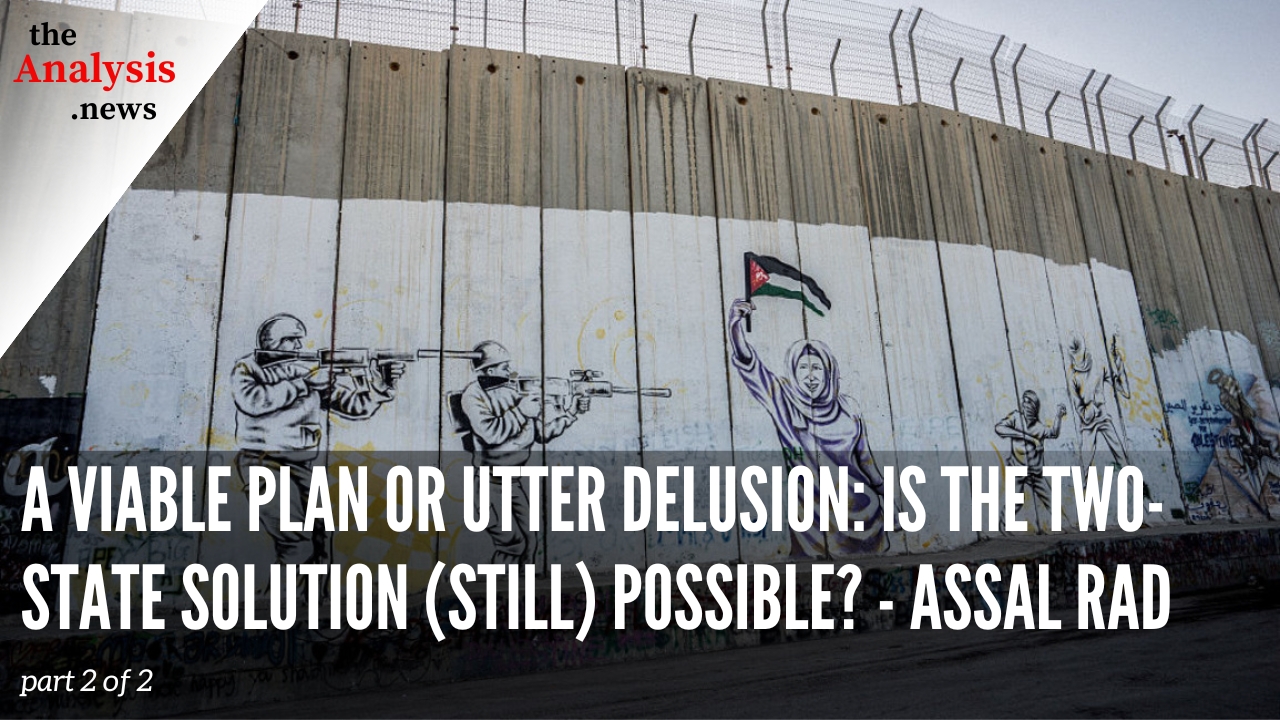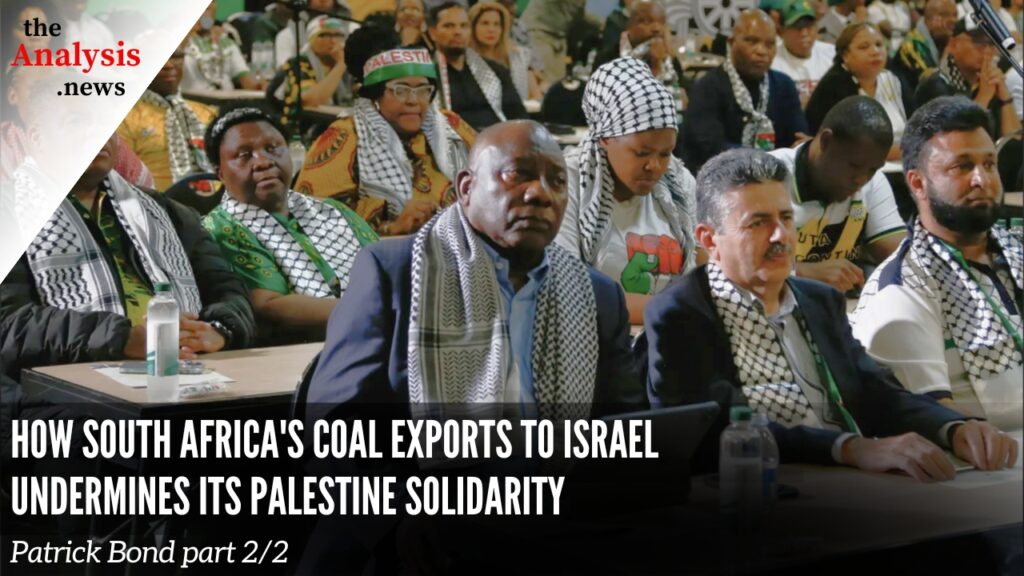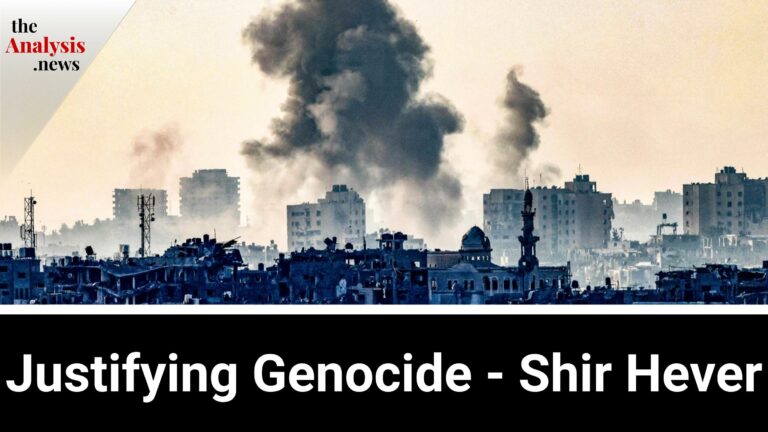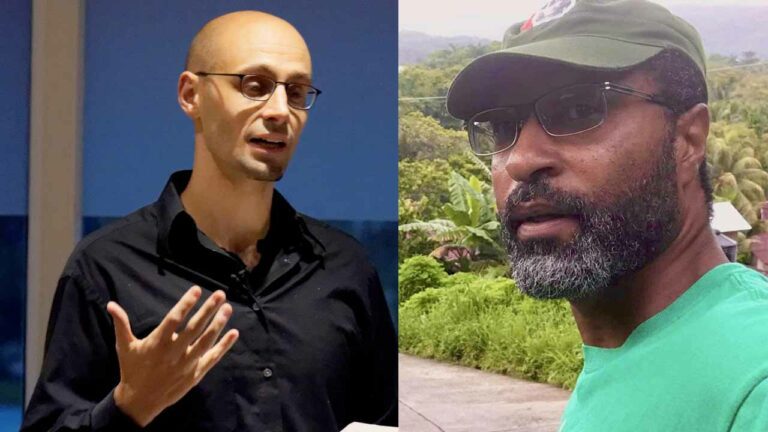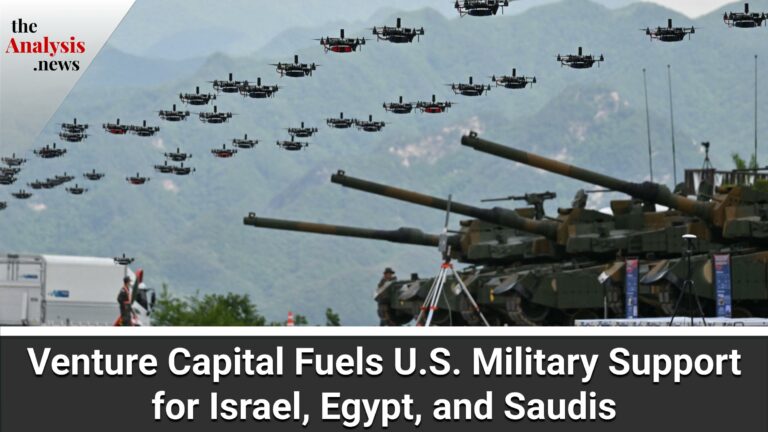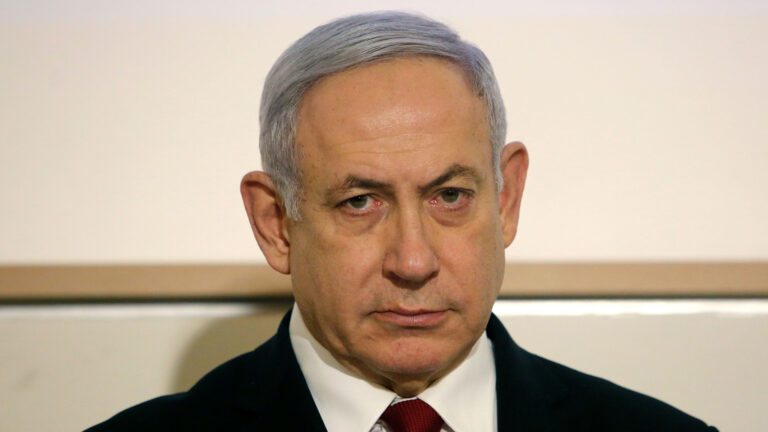In Part 2, Assal Rad speaks to the importance of U.S. airman Aaron Bushnell’s self-immolation in front of the Israeli embassy in Washington, D.C., where he stated that he would “not be complicit in genocide” in the Gaza Strip. Assal Rad, scholar of the Middle East, highlights the Biden administration’s deceitful unwillingness to hold Israel to account in the face of the IDF’s well-documented atrocities in Gaza while it simultaneously withholds funding from the United Nations Relief and Works Agency for Palestine Refugees (UNRWA) on the mere basis of allegations.
Defying the World: Why the West Won’t Stop Israel’s Slaughter in Rafah – Assal Rad part 1/2
Talia Baroncelli
You’re watching theAnalysis.news, and I’m your host, Talia Baroncelli. You’re currently watching part 2 of my discussion with historian Assal Rad. If you’d like to go to part 1 before you listen to this segment, we’d recommend that you do so.
You can support the show by going to our website, theAnalysis.news. Don’t hesitate to give us a small boost. We really appreciate all of your contributions. Get onto our mailing list and like and subscribe to the show wherever you listen to us, be it on YouTube, Spotify, or Apple. Enjoy the rest of my discussion with Assal Rad.
Joining me now is Assal Rad. She is a historian and scholar on the Middle East and the author of the book State of Resistance: Politics, Culture, and Identity in Modern Iran. You might have seen her post on social media as well, documenting the headlines written by mainstream media outlets on what’s going on in Gaza and the twisted narrative that they are presenting. So thanks very much for joining me to speak about these issues.
Assal Rad
Of course. Thank you for having me.
Talia Baroncelli
I think it’s really difficult to see the various just solutions when you have a U.S. government that continues to supply weapons to Israel and when certain European countries continue to supply weapons to Israel. When the ICJ’s ruling is not being followed, it requires the countries to do everything in their power to ensure that the obligations of state parties are actually respected and that countries prevent the plausible risk of genocide from continuing.
It’s hard to see a way out, but at the same time, it’s still really important to discuss the various configurations and the various potential solutions. I think it’s important to speak about one country, one vote. What does that mean for everyone involved?
I think a member of Knesset, Ofer Cassif, has spoken about this perception or portrayal of the rights of Israelis and Palestinians as being a zero-sum game. He has argued that if only certain people have rights and others don’t, that affects everyone’s rights and is a bad outcome for everyone.
Given what’s going on the ground, what do you think are the possible solutions? Can we even see a Palestinian state emerge when you have the U.S. government supporting an Israeli government that is blatantly fascist, blatantly racist, hell-bent on ensuring that a Palestinian state will not emerge?
We’ve seen Netanyahu, over the decades, ensure that there is support for Hamas. He’s made sure that money and finances go to Hamas in order to have Hamas be in power so that he could say that there’s no real legitimate authority with which Israel can actually negotiate. They can’t negotiate with terrorists, etc. He’s propped up Hamas for his own political purposes in order to defer or prevent the creation of a Palestinian state.
Assal Rad
Well, you have the most basic component of a solution, which is freedom for Palestinians. Now, however you want to configure what that means or how that is manifested, ultimately, that’s all that’s being asked for. Freedom for Palestinians. That’s Palestinians in the West Bank, in East Jerusalem, and in Gaza. Palestinians must have freedom and equal rights, self-determination of some kind, which they do not have and have not had for decades. Until that basic right is addressed, there will continue to be a problem. The issue with framing this conflict as a two-sided conflict makes it seem as though you have two states that are in conflict with each other. That’s not the case at all.
First of all, Palestinians do not have a state. That’s one problem. But also, they do not have power. There’s one nuclear arm, the only nuclear-armed state in the Middle East, with one of the most advanced militaries in the world, supported by the most powerful country in the world, with an Air Force, a Navy, a military against a population that has none of those things, that is occupied, that doesn’t even have control over its own resources. We heard that very early in this conflict. You heard Israeli officials saying things like, “We’re going to cut off their food, water, and electricity.” Why can they do that? Because they have the power to. They can hit a switch, and there you go, it’s off. Palestinians do not have the same power to reciprocate.
This is not a two-sided issue. This is one where you have an oppressor, and you have a population that is oppressed. Until we address that issue, this will continue to be a conflict.
Now, in terms of the way that this U.S. administration and previous U.S. administrations have used the language that they use and why it doesn’t seem to fit, well, how do you achieve anything that I just said? Well, we could go by international law. We could actually think that the institutions that we created in the wake of World War II have meaning and a purpose, and we could use them for that end. But we don’t. We use them selectively.
When you have states that wield power and selectively impose international law, it’s no longer international law. It’s just a tool for imperialism. It’s just another tool that they use to justify when they want to invade a country like Iraq in 2003. Those tools cannot be used to stop what is plausibly a genocide right now in Gaza because it is undermined by that very country that has power, the United States.
None of this is new. That’s one of the things to, as a historian, if you’ve read the history of the region, if you’ve read any colonial history, you know that this is the language that colonialism has always used.
In the wake of the American Revolution and the French Revolution, in the post-Enlightenment, when Europeans and the West were talking about ideas like self-determination, sovereignty, citizenship, constitutionalism, and all these things, they were colonizing other places and other regions of the world. They never used the language of, “We’re coming here to steal all of your resources and kill your people if need be,” they used the language of, “We’re here to help you. We’re here to civilize you. Under British tutelage, you will also become civilized like we are. Look, we have these wonderful documents, these wonderful ideas.” But those ideas were never actually applied to those places because that was not the intention. The intention was to exploit those people, exploit those lands, and exploit those resources. There should be no surprise that that is exactly the language we continue to see.
Just today, in a State Department briefing, a State spokesperson, Matthew Miller, was asked, the reporter first raised the question of, “Well, when the Prime Minister of Israel is telling you they do not want a Palestinian state, they reject the concept of Palestinian state, but your administration is saying that’s what you want, then how do you do that?” Miller had a boilerplate response. Then the reporter pushes back and says, “Well, but you have so much leverage you could use over Israel. Why not just use the weapons, U.S. weapons, as leverage?” Miller’s response was, “Israel is a sovereign state, and so we cannot dictate to Israel what to do, just like we cannot dictate to any country what to do.” That is mind-blowing from a country that is currently bombing sovereign countries, that is currently sanctioning sovereign countries, civilian populations, into starvation in order to dictate what they must do. We always dictate what states must do. We do it all the time.
Israel can make policy decisions, which it can, but the Biden administration is acting like we have no ability to affect that. I’m not even talking about punitive measures. We haven’t even gotten to that stage in which the U.S. can very easily use punitive measures against adversarial states when they want to affect its behavior. How about not vetoing UN resolutions against ceasefires? How about conditioning military aid and conditioning the transfer and sale of weapons? But this administration will not even entertain the most basic principles of accountability. How about not rejecting the ICJ decision, not calling South Africa’s case meritless? Just the language that they use is so important in framing the way that people think about this.
The fact that what they say has no relevance to what they do is nothing new in colonial history. It’s just that we don’t understand and recognize that this is still imperialism because we live in this— which I think that fantasy of the international world order has been completely gutted by what we have seen happen in Gaza over the last four and a half months. There is no such border because a country where the U.S. has arguably the most leverage is being protected diplomatically by the United States despite being on trial for genocide.
Talia Baroncelli
Well, I think it is a double-edged sword to a certain extent because when you look at international law, it did emerge out of this European colonial context.
In the early 1900s, they were still using terminology like civilized nations, semi-civilized nations, and barbaric or primitive societies that didn’t even have the right to have rights in a way. They used this language in legal opinions, in treaties, and that sort of thing.
The Class A Mandate in the British Mandate of Palestine was considered to be a semi-civilized area where the people who were living there couldn’t administer the land themselves. So, it wasn’t independent, but in a way, it was sovereign because these people still had the right to self-determination. They really did use these categories of categorizing people according to how civilized they were.
Out of that emerged the system that we have, the UN Charter, and the rights that we have. But it’s almost like because the United States still wages so much power and is an imperial power, they’re still able to use these laws in a way or interpret them in a way to further their own interests. Sometimes, that’s through sabotaging certain treaties, vetoing resolutions, or not recognizing the rulings of the International Court of Justice.
Countries in the Global South must be asking, “How do we reform this system from the bottom up? How do we make it serve our own interests and ensure that there’s a quality of states, which clearly isn’t the case?” But it’s almost like the system that can afford countries’ rights is also a system that can oppress them. That’s the largest tension within international law, I think. I don’t know if you see it the same way.
Assal Rad
No, I think that’s absolutely true. Basically, those institutions serve maybe a purpose for the historical context in which they emerged, and they don’t anymore. We have to actually rethink. The problem is when you hear Western officials use the phrase international community, they don’t really mean the international community. They don’t mean the Global South. They mean Europe and the U.S.. Europe, the U.S., Canada, basically, the Western world, however you want to describe it. They’re not really talking about everyone because of exactly how you just said it, that language of civilized. All they’ve done is water down that language a bit, not even completely.
They use here, and not in every case, but in most cases now, you hear less overtly racist language. Not in the case of Israel. In the case of Israel, you hear very overtly racist language without a problem, whether it’s on their television and media or from officials. They’re using extremely overtly racist language. What you hear with European and American officials is less so that, but essentially, it’s the same language. The idea is that, well, in the civilized world, this is how we conduct ourselves. But ultimately, to understand the oppression that you see in a place like Palestine…
Why Palestinians? Why is there such a difference in the way that Ukrainian resistance is depicted? The occupation of Ukraine is depicted. What Russia is doing in Ukraine is depicted versus everything when you talk about Palestinians. I don’t think you can fully understand it without understanding white supremacy and the racist elements that go into the dehumanization, not just of Palestinians, who have been dehumanized to the point that it is just disgusting to watch the extent to which Palestinians have been dehumanized. But it’s the broader Arab and Muslim world that has been dehumanized. It’s not just Palestinians, but they belong to this larger cultural group that has been dehumanized historically in the West and continues to be so.
Talia Baroncelli
I think part of it, too, is also on the part of the U.S., for example. They want to ensure that the same transnational capitalist class is safeguarded and that they’re not undermined. I think part of this allegiance towards Israel, regardless of whatever humanitarian law it contravenes, is to ensure that it gets the weapons that it needs so that it can remain safe and to ensure that its government won’t collapse so that there won’t be any mass uprisings in order to ensure that those same elites which support—there’s reciprocity here— which support the U.S. are also in place.
I recently saw Nancy Pelosi at, I think it was a Munich security conference, and it’s just this horrible interview. She said, “Of course, we’re not going to stop giving weapons to Israel.” The interviewer asked, “Israel has killed 30,000 people, many of whom are women and children. Why won’t you put any conditions on these weapons? You have leverage, as you mentioned. You have leverage, and you can withhold these weapons.” And then she said, “Well, these weapons aren’t being used in the current operation,” which I think is factually wrong because the U.S. did bypass Congress in order to ensure that certain tanks, weaponry, and ammunition were getting to Israel. I think this was in December, twice, right? You would know this because you’re in the U.S. This was a huge deal. These are also weapons that the U.S. might need at some point, but they would even undermine their own security to ensure that Israel would get this.
Even though what she says is factually incorrect, it’s really interesting that she argues that Israel has its own massive weapons stockpiles and that it doesn’t need U.S. support. It only needs support in the long term to ensure Israel’s long-term security. So maybe this blind dedication to Israel also serves an additional purpose of ensuring that a global hierarchy exists where America’s interests, elite interests, are also served when necessary. All of this is being done by risking what the ICJ called for in its interim ruling, namely that countries should do everything in their power to prevent a risk of genocidal acts from taking place, a risk of the obligations that are stated in the genocide convention from being contravened. This would entail ensuring that humanitarian aid gets into the Gaza Strip, that weapons are not being supplied to Israel, and that there’s no support for the military operation. Yet this continues blindly.
Assal Rad
Something else to keep in mind about the weapons that are going to Israel from the U.S. is that it’s not just a question of international law but domestic U.S. law. The U.S. has laws that say U.S. weapons cannot be used in gross human rights violations, which they are currently being used.
In fact, in February, I believe it was in early February, the Biden administration, there were stories coming out saying that President Biden was reaffirming that law. It’s nothing new. This is something that’s on the books. U.S. weapons cannot be used for gross human rights violations. But then, when they’re asked, “Is Israel committing any war crimes?” The response is, “It’s not something we’re assessing right now. The conflict is ongoing, so we can’t make that assessment right now.” Or, Kirby said that the conflict might be wrapping up soon, so there’s no point in actually making that determination because it’ll be over soon, so it doesn’t matter.
But that determination was made, I think, within 10 days of Russia’s invasion of Ukraine. You had [Antony] Blinken talking about credible evidence of war crimes. Within 10 days, you had the Secretary of State talking about credible evidence of war crimes. Within, I want to say, five weeks or so, you had President Biden referring to Putin’s actions as genocide.
In the case of Russia, it was very easy to do assessments and draw those conclusions. In the case of Israel, for whatever reason, it’s impossible to do so. The double standards, the hypocrisy, are so deep and so in your face that it’s impossible not to see it once you see it if that makes sense.
The way that they often get away with this stuff is that no one’s really paying that close attention to these things. On average, the average American, the average person in any country, is not closely following, especially in the details of its foreign policy, because it’s closely following whatever their number one issues are in their own lives. The economy, inflation, jobs, taking care of their families, getting food on the table, and having health insurance. These are the basic needs that people have, and in every society, these are the first concerns that they have, rightfully so.
What is happening in Gaza is so egregious and horrifying and is being live-streamed on our devices in a way that makes it impossible for them to use the same language without getting constant pushback and backlash. That, in part, is because of social media.
Social media has its cons in the sense that it is also a breeding ground for misinformation and disinformation to spread, but at the same time, it also spreads real information. By doing so, more people have access to information that they would not have. Because if you look at mainstream mainstream media, they’re not covering this stuff. They’re not showing you these videos. When they do, the language they use, the framing is so far removed from reality—just the simplest differences. Israelis are killed, Palestinians die. I’ve seen headlines say lifeless Palestinians. In just any language, not to say that they were killed. Oftentimes, Palestinian children are not referred to as children. They’re referred to as people under 18. Again, all to take away from the humanization of this population and what’s happening. But because of social media and independent journalism and all of these different places that people can get information from, it is much harder for them to get away with this level of hypocrisy.
How is that impacting things? Well, it threatens the ability of this administration to be re-elected in November. Key demographics and key swing states are at risk currently, in part because of these policies. That is happening because people are seeing that hypocrisy. They are seeing what is happening in Gaza, and they cannot turn a blind eye to it because it is unbelievably horrific to turn a blind eye to what is happening.
Talia Baroncelli
Well, just one last thing before we end, and I think we should just briefly speak about Aaron Bushnell, who was a U.S. airman. I believe he was 25 or 26 years old, very young, and went to the Israeli Embassy in Washington. He was livestreaming this. He said that he was going to protest Israel’s bombardment and mass murder of the Palestinians. He said, ‘Free Palestine.’
Assal Rad
He actually said…
Talia Baroncelli
Sorry?
Assal Rad
He actually used the word genocide. U.S. complicity in genocide.
Talia Baroncelli
Yes, complicity in genocide. That’s very important because he’s a U.S. service member, a member of the military, the army. That’s a key point that you bring up, that he himself had this on his conscience, that he’s complicit in this as well, and that his government is complicit in what’s going on in the Gaza Strip. He went in front of the embassy and said, ‘Free Palestine,’ and set himself on fire.
It seems like there are some unclear statements as to what happened after the fact. I don’t know if embassy members just pointed guns at him and didn’t actually call an ambulance on time, if they perceived him as a threat, or if they just wanted him to die. I don’t know what happened afterward. Unfortunately, he was taken into critical care at the hospital, and he died. This is not the first time this has happened. I think there was a similar incident in Atlanta a few months ago.
This reminds me, not that I was there, but of course, it reminds me of what happened in 1963 when you had Buddhist monks in South Vietnam protesting [Ngô Đình] Diệm’s regime and protesting the army forces in opposition to atrocities committed there.
I wonder, with all the protests that we’ve seen, young people and students protesting, do you see this as a new revitalized Vietnam moment that’s taking hold of people’s consciences?
Assal Rad
I’m glad you brought up Aaron Bushnell because the image and video of that were really, really horrifying to see. This is a young American service member who, with his last breaths, shouted, ‘Free Palestine. ‘ The fact that we know his name, that we know the story is because he live-streamed it, and you had an independent journalist who was able to follow the story closely, contact the family, have this information, and share it for the world to see. You mentioned another self-immolation that happened in Atlanta. You’d be hard-pressed to find; I don’t think we still know the name of that person.
Talia Baroncelli
No, I don’t remember seeing anything; any news on it when it actually happened? I just found out about it now, reading about Aaron.
Assal Rad
The attempt to cover these things up, these stories up, is because there’s growing… this is the most extreme act of protest, I think at least, the most extreme act of protest that exists. What you’ll see, again, is the difference in how his actions will be construed by, again, those who are supporting Israel’s actions in Gaza. He’ll be called mentally ill. He’ll be called someone who had mental health issues.
Aaron Bushnell did not hurt another person in this incredible act. He hurt himself. He very clearly made a statement as to his intention and the reason for his action. That, to me, is not something that you can write off as a mental health crisis. It was a very, very conscious decision in a very specific situation. Again, we only know the story because of the fact that he live-streamed it as it was happening, and that video became available.
I think that even before that, this moment is an inflection point. We’ve been seeing protests across the U.S. and across the world for months. People keep protesting for months. This is despite the hysteria that you’re seeing in Western societies against protesters. These are societies that champion themselves on freedom of expression and assembly in protest. And yet, protesters, whether they’re on university campuses or out, are tarnishing their reputations. They’re called terrorist sympathizers. They’re called anti-Semitic. It’s as if there is no legitimate reason for people to take issue with the actions of Israel despite the fact that the overwhelming majority of the world takes issue with Israel’s actions.
I hope that Aaron’s sacrifice is not in vain. I hope that people do remember his name, and I think that they will because I think that is an image that’s going to be very hard to forget anytime in the near future. I think it will be a historic image, juxtaposed in many ways with what I think will also be historic images of U.S. officials at the UN raising their hands to veto ceasefire resolutions, one of which came after the ICJ ruling that found that Israel’s actions are plausibly genocidal. So, the U.S. vetoed the possibility of ending a genocide. I don’t think these images will be forgotten anytime soon.
Talia Baroncelli
On the same day, they withheld their funding of UNRWA and launched, I would say, baseless claims because we haven’t seen concrete evidence of the involvement of UNRWA employees with the October 7 attacks. Even if they were involved in the attacks, you can’t just pull funding from one of the most important human rights organizations that are operating in the area. They’re the ones with the infrastructure in Gaza and the West Bank and surrounding areas. You can’t deliver aid to the Gaza Strip, and you can’t actually live up to the call in the ICJ’s interim measure’s ruling to ensure that humanitarian aid gets into the Gaza Strip without having organizations like UNRWA in operation and supporting them. On that very same day that the ICJ ruling came out, several countries decided to pull their funding.
Assal Rad
Well, just to compare, the U.S. pulled its funding for UNRWA, which Biden officials have repeatedly said is vital for getting humanitarian aid to Palestinians in Gaza. This is themselves saying, vital to doing this crucial role. But they pulled funding based on allegations: allegations, no funding. Israel is on trial for genocide in the world’s highest court, and they won’t stop weapons transfers. So that should tell you where the priorities and where the double standards of this administration lie.
Talia Baroncelli
Assal Rad, it’s been really great speaking to you. Thanks so much for joining me again.
Assal Rad
Thank you. Thank you so much for having me.
Talia Baroncelli
Thanks for watching theAnalysis.news. Thank you for all of your support. Every little bit really helps us, and we appreciate it. You can write us with any concerns or comments via our website, theAnalysis.news. See you next time.
Podcast: Play in new window | Download | Embed
Subscribe Apple Podcasts | Spotify | Android | iHeartRadio | Blubrry | TuneIn | Deezer | RSS
Never miss another story
Subscribe to theAnalysis.news – Newsletter
Assal Rad received her Ph.D. in Middle Eastern history from the University of California, Irvine, and currently works on the US–Iran policy. She has written for Newsweek, the Independent, Foreign Policy, and more, and appeared on BBC World, BBC Persian, Al Jazeera, and NPR.
